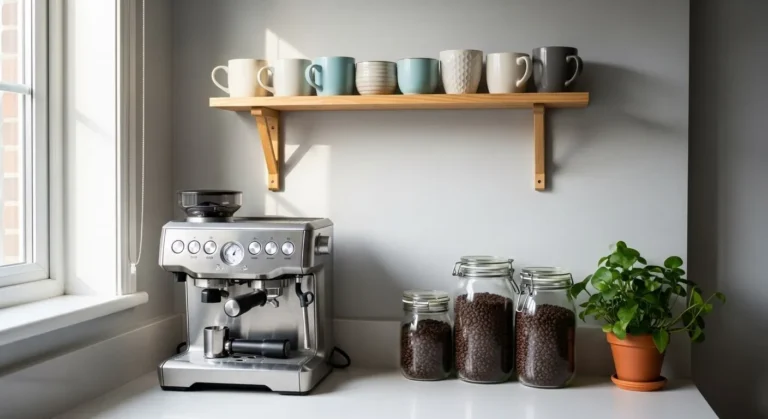How to Get Rid of Kitchen Ants Naturally
Quick Answer: To get rid of kitchen ants naturally, start by mixing equal parts of white vinegar and water. Spray this mix on ant trails, entry points, and countertops. It removes the scent trails ants follow. You can also try lemon juice, cinnamon, or peppermint oil. These natural scents confuse the ants and stop them from coming back. Keep your kitchen clean and food sealed. Repeat daily until the ants are gone.
Seeing ants in your kitchen can be so annoying. But you don’t need harsh chemicals to get rid of them. There are many safe and natural ways to stop ants from coming inside.
In this guide, you’ll learn how to get rid of kitchen ants naturally. From simple cleaning tips to using things like vinegar, lemon, and spices, these ideas are safe for your family and easy to try.
Keep your kitchen clean and ant-free with these easy natural tips.
Why Do Ants Invade Your Kitchen?
Before you fight ants, it helps to know what attracts them. Ants are constantly looking for food, water, and shelter. Your kitchen is the perfect spot because:
- Food crumbs and spills attract worker ants.
- Sticky jars and sweet foods like honey or syrup draw sugar ants.
- Pet food bowls are an easy meal for ants.
- Leaky pipes or standing water provide drinking sources.
If you don’t address these attractants, ants will keep coming back, no matter how many you kill.
Types of Ants You May Find in the Kitchen
Not all ants are the same. The most common types you’ll find indoors include:
- Sugar ants: Tiny black or brown ants that love sweets.
- Argentine ants: Small brown ants that form huge colonies.
- Carpenter ants: Bigger ants that may nest in damp wood.
- Pharaoh ants: Yellowish ants that love greasy foods.
While it doesn’t always matter which type you have for natural control, identifying them can help if you need to try different approaches.
Use Natural Deterrents That Ants Hate
Ants use scent trails to navigate. By disrupting those trails, you confuse their path and send them away.
Here are safe, natural things that repel ants:
White Vinegar
Vinegar erases scent trails and works as a mild repellent.
- Mix equal parts white vinegar and water in a spray bottle.
- Spray around countertops, baseboards, and entry points.
- Repeat daily.
Lemon Juice
Lemon’s acidity and strong smell mask trails.
- Squeeze fresh lemon juice along doorways, windows, and cracks.
- You can also mix lemon juice with water as a spray.
Essential Oils
Certain essential oils are great natural ant repellents.
- Peppermint oil: Mix 10 drops with water in a spray bottle.
- Tea tree oil: Same method, dilute with water.
- Cinnamon oil: Wipe down surfaces or place cinnamon sticks near entry points.
Cucumber Peels
Some ants dislike cucumber’s bitterness.
- Place fresh cucumber peels where ants enter.
While this won’t kill ants, it can steer them away.
| Repellent | How to Use | Benefit |
|---|---|---|
| Vinegar | Spray mix on trails | Wipes scent paths |
| Lemon Juice | Rub entry spots | Hides scent trails |
| Peppermint Oil | Spray around doors | Ants hate mint |
| Tea Tree Oil | Wipe or spray baseboards | Natural repellent |
| Cucumber | Place peels near cracks | Repels some ants |
| Cinnamon | Dust along paths | Blocks scent trail |
| Diatomaceous Earth | Sprinkle on trails | Kills ants naturally |
Block Their Entry Points
After cleaning and repelling, it’s smart to seal up the areas where ants come in.
- Use caulk to seal cracks around windows, doors, and baseboards.
- Add weather stripping to doors.
- Close gaps around pipes with sealant or steel wool.
If you see an ant trail, follow it to find out where they’re getting in.
Set Up Natural Ant Traps
Sometimes, you need to attack the colony. You can make natural DIY ant traps that worker ants carry back to their nest.
Boric Acid and Sugar Trap
Note: Use boric acid carefully, keep it away from kids and pets.
- Mix 1 teaspoon of boric acid with 4 teaspoons of sugar and 1 cup of warm water.
- Soak cotton balls in the solution.
- Place the cotton balls near ant trails.
The sugar attracts the ants, while the boric acid works slowly to kill the colony.
Baking Soda and Sugar Trap
A safer option than boric acid:
- Mix equal parts baking soda and powdered sugar.
- Sprinkle it near the ant trail.
- The sugar lures ants, and the baking soda disrupts their digestive system.
Try Diatomaceous Earth
Food-grade diatomaceous earth (DE) is a fine powder made from fossilized algae. It’s safe for people and pets but deadly for insects.
- Sprinkle DE along ant trails and around the kitchen perimeter.
- When ants walk through it, it dries out their exoskeletons.
Use only food-grade DE, never the type used for pools.
Use Natural Barriers
If you want a simple line of defense, try these powders:
- Cinnamon powder
- Coffee grounds
- Chalk
Sprinkle these along windowsills, door frames, or cracks. They help break scent trails and keep ants from crossing.
Take It Outside: Treat Outdoor Sources
Sometimes kitchen ants come from an outdoor nest. Help keep them away by:
- Trimming bushes and trees away from your house.
- Keeping firewood stacked away from the home.
- Checking for nests near the foundation.
- Sprinkling diatomaceous earth around the exterior base.
Natural Bait Stations vs. Chemical Sprays
Store-bought chemical sprays often kill visible ants but miss the colony. Natural bait stations work slower but target the source.
Patience is key, it can take a week or two for a natural bait to destroy the colony. Keep your traps fresh and away from kids and pets.
When to Call a Professional
If you’ve tried everything but the ants keep coming back, you may have a larger infestation, especially with carpenter ants or multiple colonies.
In that case, it’s smart to hire a licensed pest control professional who uses eco-friendly methods.
Tips to Keep Ants Away for Good
Once you get rid of the ants, keep up good habits to stop them from returning:
- Wipe down counters every night.
- Store food in sealed containers.
- Take out trash daily.
- Keep floors clean of crumbs.
- Seal cracks and entry points as needed.
- Trim plants touching the house.
Ants in your kitchen are frustrating, but harsh chemicals aren’t your only option. With regular cleaning, smart natural repellents, and a few DIY traps, you can safely kick ants out and keep them from coming back.
Remember: consistency is key. Small steps every day make your kitchen an unwelcome place for ants naturally.
Quick Daily Ant-Free Habits
- Wipe counters (2 min)
- Sweep crumbs (3 min)
- Empty trash (1 min)
- Check pet bowls (1 min)
- Spray natural repellent (1 min)
Total time: 8 minutes a day
Frequently Asked Questions
Are ants dangerous in the kitchen?
Most household ants aren’t dangerous, but they can spread germs if they crawl over food prep areas. Some species, like carpenter ants, can damage wooden structures if left unchecked. Keeping your kitchen ant-free helps maintain hygiene and protects your home.
Can I use baking soda alone to get rid of ants?
Baking soda works best when paired with a bait, like sugar, because the sugar attracts the ants and the baking soda disrupts their digestion. Sprinkling baking soda alone may repel some ants, but a bait method targets the colony more effectively.
Is vinegar safe to use on kitchen surfaces?
Yes! Vinegar is a natural cleaner and deodorizer. Spraying diluted vinegar helps remove ant scent trails and sanitize counters. Just avoid using vinegar on natural stone surfaces like marble or granite, as it can dull the finish.
How long does it take to get rid of ants naturally?
Natural methods usually take a little longer than chemical sprays. With consistent cleaning, sealing, and baiting, most kitchens see a big reduction within 1–2 weeks. Keep using repellents and good habits to prevent ants from coming back.
What if my ant problem keeps coming back?
If you’ve tried multiple natural methods and ants still return, it could mean there’s a large nest inside walls or outdoors. Consider calling a pest control expert who uses eco-friendly solutions to find and remove the colony.
Remember: your kitchen doesn’t have to be a welcome mat for ants. With simple, natural remedies and a few habit changes, you can enjoy a clean, pest-free cooking space without harsh chemicals.
Read More: Best Colors for a Relaxing Bedroom, How to Remove Wall Stains Without Removing Paint







One Comment